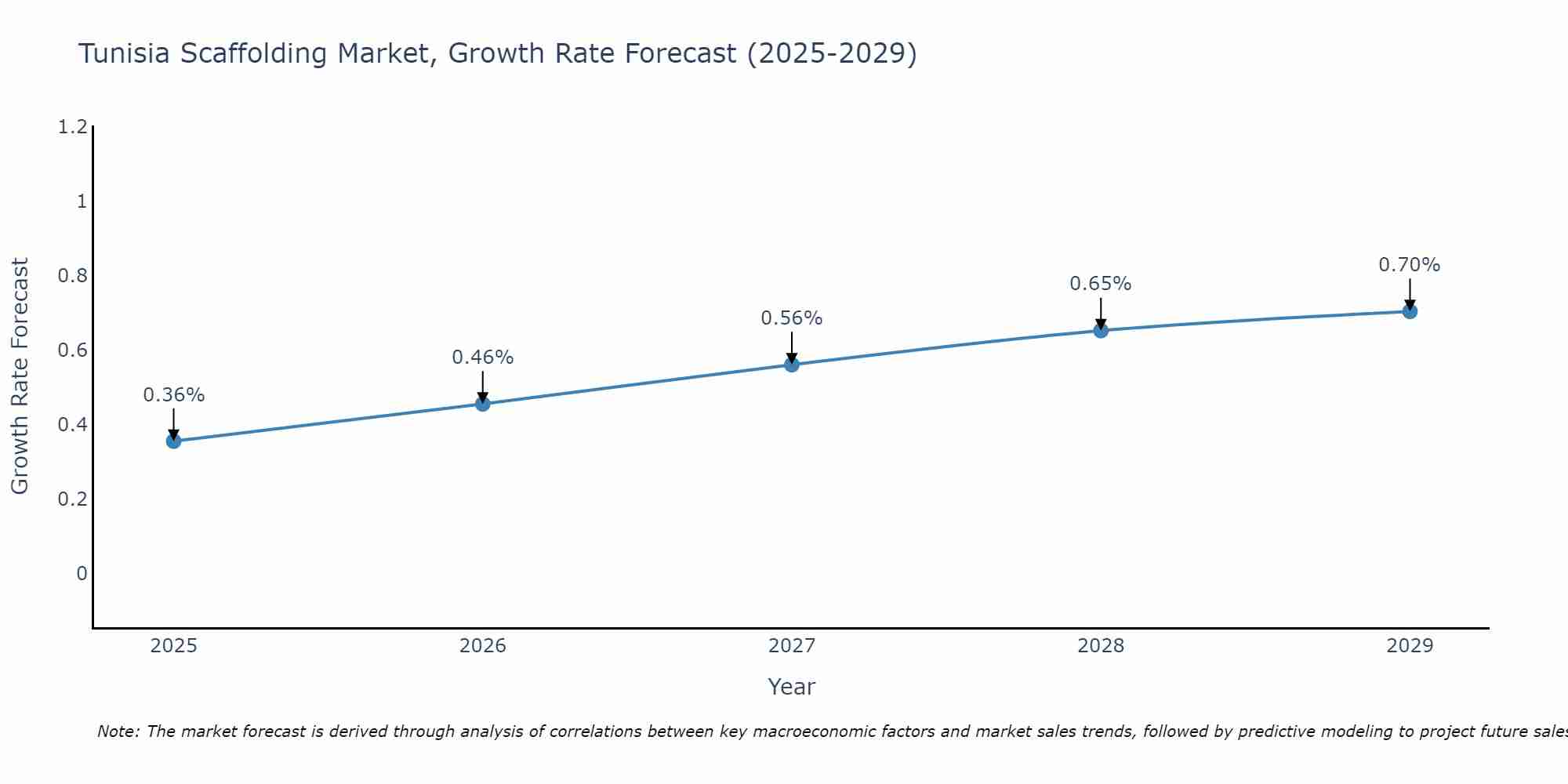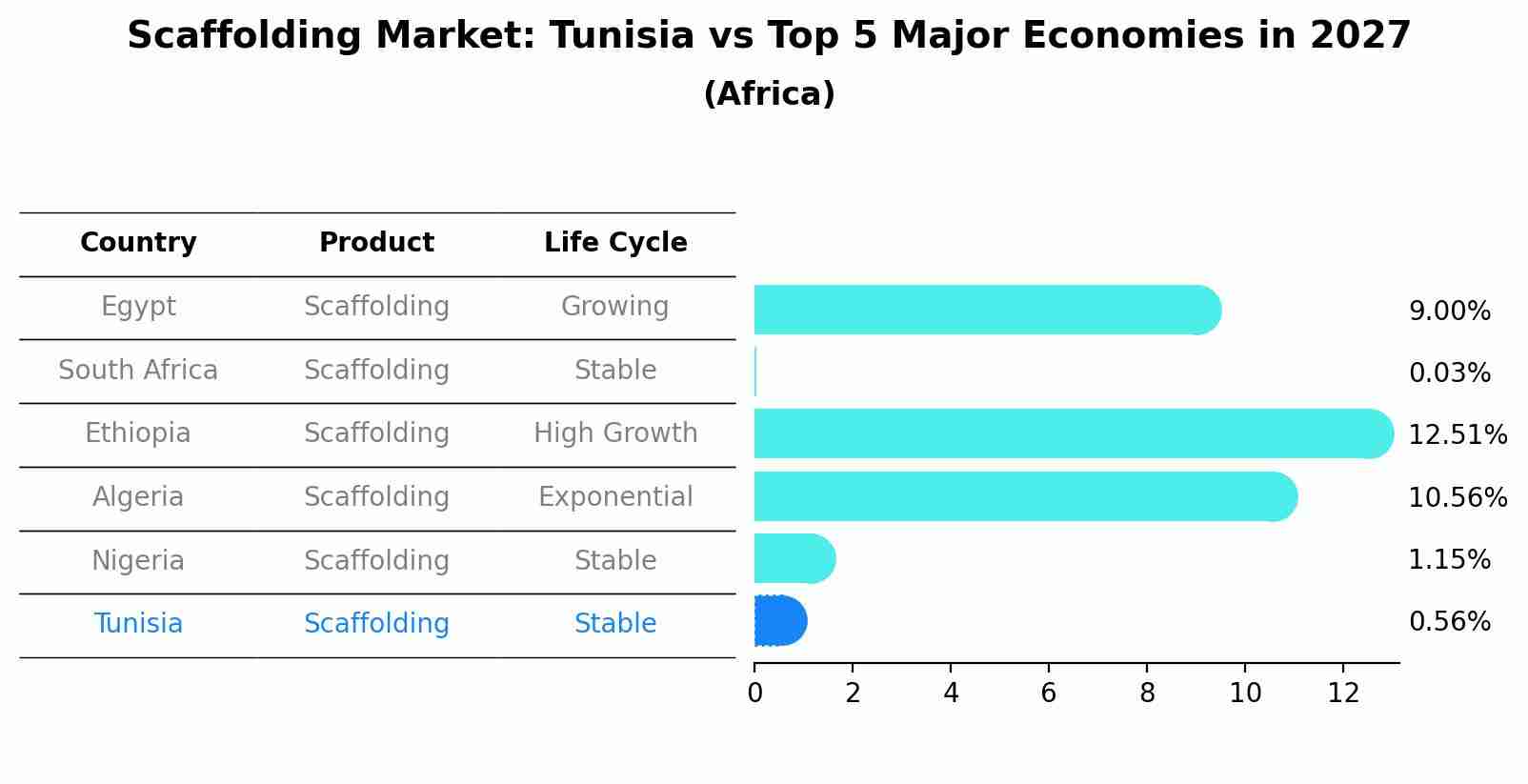Tunisia Scaffolding Market Outlook | Growth, Value, Industry, Companies, Trends, Forecast, COVID-19 IMPACT, Analysis, Revenue, Size & Share
| Product Code: ETC377814 | Publication Date: Aug 2022 | Updated Date: Jul 2025 | Product Type: Market Research Report | |
| Publisher: 6Wresearch | Author: Bhawna Singh | No. of Pages: 75 | No. of Figures: 35 | No. of Tables: 20 |
Tunisia Scaffolding Market Size Growth Rate
The Tunisia Scaffolding Market is likely to experience consistent growth rate gains over the period 2025 to 2029. Commencing at 0.36% in 2025, growth builds up to 0.70% by 2029.

Scaffolding Market: Tunisia vs Top 5 Major Economies in 2027 (Africa)
In the Africa region, the Scaffolding market in Tunisia is projected to expand at a stable growth rate of 0.56% by 2027. The largest economy is Egypt, followed by South Africa, Ethiopia, Algeria and Nigeria.

Tunisia Scaffolding Market Synopsis
The Tunisia scaffolding market is experiencing steady growth driven by increasing construction activities in the country. The market is primarily driven by infrastructure development projects, commercial construction, and industrial projects. The demand for scaffolding is also being fueled by the growing focus on safety regulations and standards in the construction industry. Key players in the Tunisia scaffolding market offer a wide range of products including steel, aluminum, and fiberglass scaffolding, as well as accessories and services. The market is characterized by intense competition, with companies focusing on product innovation, quality, and cost-effectiveness to gain a competitive edge. Overall, the Tunisia scaffolding market is poised for continued growth in the coming years as the construction industry expands and modernizes.
Tunisia Scaffolding Market Trends
Currently, the Tunisia scaffolding market is experiencing steady growth due to increased construction activities in sectors such as commercial, residential, and industrial. The demand for scaffolding systems is driven by infrastructure development projects, renovations, and maintenance work. Aluminum scaffolding is gaining popularity in Tunisia due to its lightweight properties and ease of assembly, offering increased safety and efficiency on construction sites. Additionally, there is a growing focus on sustainability and environmentally friendly practices in the market, leading to the adoption of eco-friendly scaffolding materials. The market is witnessing competition among key players to offer innovative scaffolding solutions that meet safety standards and enhance productivity, reflecting a shift towards more advanced and technologically integrated scaffolding systems in Tunisia.
Tunisia Scaffolding Market Challenges
In the Tunisia scaffolding market, some of the key challenges faced include a lack of standardized regulations and safety standards governing the industry, which can lead to inconsistencies in quality and safety practices among different scaffolding providers. Additionally, there may be issues related to the availability of skilled labor with proper training in scaffolding erection and dismantling, which can impact the efficiency and safety of construction projects using scaffolding. Economic fluctuations and political instability in the region can also affect the overall demand for scaffolding services, leading to market uncertainties for both suppliers and customers. Overall, addressing these challenges through improved regulations, training programs, and market stability measures could help enhance the growth and professionalism of the Tunisia scaffolding market.
Tunisia Scaffolding Market Investment Opportunities
The Tunisia scaffolding market presents promising investment opportunities due to the growth in construction activities across various sectors such as residential, commercial, and industrial. With ongoing infrastructure development projects and the government`s focus on enhancing the construction industry, there is a rising demand for scaffolding solutions. Investors can consider opportunities in supplying high-quality scaffolding materials, rental services, and innovative scaffolding technologies to meet the evolving needs of the market. Additionally, offering training programs for workers on safe scaffolding practices can also be a lucrative investment avenue. By capitalizing on the growing construction sector in Tunisia and providing reliable scaffolding solutions, investors can tap into a market with significant growth potential.
Jordan Agar Market Government Policies
The Tunisian government has implemented policies aimed at regulating the scaffolding market to ensure safety standards and quality control. The National Institute of Standardization and Industrial Property (INNORPI) is responsible for setting technical regulations and standards for scaffolding products to guarantee compliance with international norms. Additionally, the Ministry of Industry and Small and Medium-Sized Enterprises oversees the licensing and certification process for scaffolding companies to operate in the market. Strict enforcement of these regulations is crucial to prevent accidents and maintain the integrity of construction projects. Overall, the government`s focus on quality control and safety measures plays a significant role in shaping the scaffolding market in Tunisia.
Tunisia Scaffolding Market Future Outlook
The Tunisia scaffolding market is projected to witness steady growth in the coming years, driven by increasing construction activities across the country. The expanding industrial sector, infrastructure development projects, and government initiatives to boost the construction industry are expected to drive the demand for scaffolding solutions. Additionally, the rising focus on safety regulations and the adoption of advanced scaffolding technologies are likely to further propel market growth. With ongoing urbanization and the need for modern infrastructure, the Tunisia scaffolding market is poised for expansion, presenting opportunities for both domestic and international scaffolding companies to capitalize on the growing demand in the region.
Key Highlights of the Report:
- Tunisia Scaffolding Market Outlook
- Market Size of Tunisia Scaffolding Market, 2021
- Forecast of Tunisia Scaffolding Market, 2031
- Historical Data and Forecast of Tunisia Scaffolding Revenues & Volume for the Period 2018 - 2031
- Tunisia Scaffolding Market Trend Evolution
- Tunisia Scaffolding Market Drivers and Challenges
- Tunisia Scaffolding Price Trends
- Tunisia Scaffolding Porter's Five Forces
- Tunisia Scaffolding Industry Life Cycle
- Historical Data and Forecast of Tunisia Scaffolding Market Revenues & Volume By Type for the Period 2018 - 2031
- Historical Data and Forecast of Tunisia Scaffolding Market Revenues & Volume By Supported Scaffolding for the Period 2018 - 2031
- Historical Data and Forecast of Tunisia Scaffolding Market Revenues & Volume By Suspended Scaffolding for the Period 2018 - 2031
- Historical Data and Forecast of Tunisia Scaffolding Market Revenues & Volume By Rolling Scaffolding for the Period 2018 - 2031
- Historical Data and Forecast of Tunisia Scaffolding Market Revenues & Volume By Material for the Period 2018 - 2031
- Historical Data and Forecast of Tunisia Scaffolding Market Revenues & Volume By Aluminum for the Period 2018 - 2031
- Historical Data and Forecast of Tunisia Scaffolding Market Revenues & Volume By Wood for the Period 2018 - 2031
- Historical Data and Forecast of Tunisia Scaffolding Market Revenues & Volume By Steel for the Period 2018 - 2031
- Historical Data and Forecast of Tunisia Scaffolding Market Revenues & Volume By End User for the Period 2018 - 2031
- Historical Data and Forecast of Tunisia Scaffolding Market Revenues & Volume By Residential for the Period 2018 - 2031
- Historical Data and Forecast of Tunisia Scaffolding Market Revenues & Volume By Commercial for the Period 2018 - 2031
- Historical Data and Forecast of Tunisia Scaffolding Market Revenues & Volume By Industrial for the Period 2018 - 2031
- Tunisia Scaffolding Import Export Trade Statistics
- Market Opportunity Assessment By Type
- Market Opportunity Assessment By Material
- Market Opportunity Assessment By End User
- Tunisia Scaffolding Top Companies Market Share
- Tunisia Scaffolding Competitive Benchmarking By Technical and Operational Parameters
- Tunisia Scaffolding Company Profiles
- Tunisia Scaffolding Key Strategic Recommendations
Frequently Asked Questions About the Market Study (FAQs):
- Single User License$ 1,995
- Department License$ 2,400
- Site License$ 3,120
- Global License$ 3,795
Search
Related Reports
- ASEAN Bearings Market (2025-2031) | Strategy, Consumer Insights, Analysis, Investment Trends, Opportunities, Growth, Size, Share, Industry, Revenue, Segments, Value, Segmentation, Supply, Forecast, Restraints, Outlook, Competition, Drivers, Trends, Demand, Pricing Analysis, Competitive, Strategic Insights, Companies, Challenges
- Europe Flooring Market (2025-2031) | Outlook, Share, Industry, Trends, Forecast, Companies, Revenue, Size, Analysis, Growth & Value
- Saudi Arabia Manlift Market (2025-2031) | Outlook, Size, Growth, Trends, Companies, Industry, Revenue, Value, Share, Forecast & Analysis
- Uganda Excavator, Crane, and Wheel Loaders Market (2025-2031) | Strategy, Consumer Insights, Analysis, Investment Trends, Opportunities, Growth, Size, Share, Industry, Revenue, Segments, Value, Segmentation, Supply, Forecast, Restraints, Outlook, Competition, Drivers, Trends, Demand, Pricing Analysis, Competitive, Strategic Insights, Companies, Challenges
- Rwanda Excavator, Crane, and Wheel Loaders Market (2025-2031) | Strategy, Consumer Insights, Analysis, Investment Trends, Opportunities, Growth, Size, Share, Industry, Revenue, Segments, Value, Segmentation, Supply, Forecast, Restraints, Outlook, Competition, Drivers, Trends, Demand, Pricing Analysis, Competitive, Strategic Insights, Companies, Challenges
- Kenya Excavator, Crane, and Wheel Loaders Market (2025-2031) | Strategy, Consumer Insights, Analysis, Investment Trends, Opportunities, Growth, Size, Share, Industry, Revenue, Segments, Value, Segmentation, Supply, Forecast, Restraints, Outlook, Competition, Drivers, Trends, Demand, Pricing Analysis, Competitive, Strategic Insights, Companies, Challenges
- Angola Excavator, Crane, and Wheel Loaders Market (2025-2031) | Strategy, Consumer Insights, Analysis, Investment Trends, Opportunities, Growth, Size, Share, Industry, Revenue, Segments, Value, Segmentation, Supply, Forecast, Restraints, Outlook, Competition, Drivers, Trends, Demand, Pricing Analysis, Competitive, Strategic Insights, Companies, Challenges
- Israel Intelligent Transport System Market (2025-2031) | Strategy, Consumer Insights, Analysis, Investment Trends, Opportunities, Growth, Size, Share, Industry, Revenue, Segments, Value, Segmentation, Supply, Forecast, Restraints, Outlook, Competition, Drivers, Trends, Demand, Pricing Analysis, Competitive, Strategic Insights, Companies, Challenges
- Uganda Precast and Aggregate Market (2025-2031) | Strategy, Consumer Insights, Analysis, Investment Trends, Opportunities, Growth, Size, Share, Industry, Revenue, Segments, Value, Segmentation, Supply, Forecast, Restraints, Outlook, Competition, Drivers, Trends, Demand, Pricing Analysis, Competitive, Strategic Insights, Companies, Challenges
- Australia IT Asset Disposal Market (2025-2031) | Strategy, Consumer Insights, Analysis, Investment Trends, Opportunities, Growth, Size, Share, Industry, Revenue, Segments, Value, Segmentation, Supply, Forecast, Restraints, Outlook, Competition, Drivers, Trends, Demand, Pricing Analysis, Competitive, Strategic Insights, Companies, Challenges
Industry Events and Analyst Meet
Our Clients
Whitepaper
- Middle East & Africa Commercial Security Market Click here to view more.
- Middle East & Africa Fire Safety Systems & Equipment Market Click here to view more.
- GCC Drone Market Click here to view more.
- Middle East Lighting Fixture Market Click here to view more.
- GCC Physical & Perimeter Security Market Click here to view more.
6WResearch In News
- Doha a strategic location for EV manufacturing hub: IPA Qatar
- Demand for luxury TVs surging in the GCC, says Samsung
- Empowering Growth: The Thriving Journey of Bangladesh’s Cable Industry
- Demand for luxury TVs surging in the GCC, says Samsung
- Video call with a traditional healer? Once unthinkable, it’s now common in South Africa
- Intelligent Buildings To Smooth GCC’s Path To Net Zero













